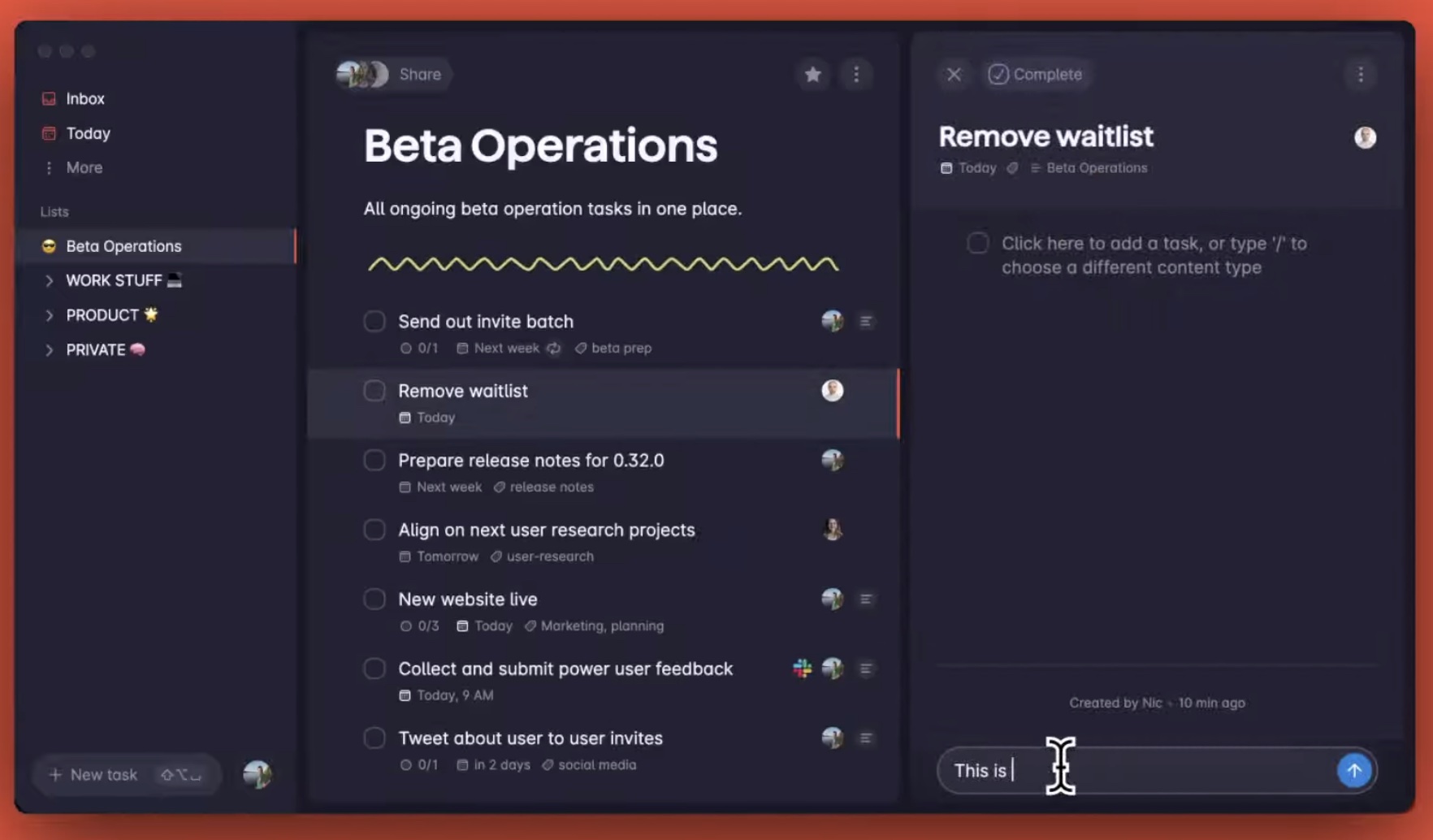[ad_1]
The former founder of the to-do list app that sold for $200 million is back, nine years later, with another app to do the same thing. In fact? This is a story that will be difficult to create, but it is happening.
I guess you can’t keep a good founder down. After selling his first startup – to-do list app Wunderlist – to Microsoft in 2015, Christian Reber (pictured above) could make a return with his angel investments (for example he is an investor in Notion). Instead, he launched a new company, Pitch, Now they have to find a new CEO, But long ago they also decided to have their own “to-do app” still need to scratch,
This week he finally brought superlist Out of beta. It’s a smartphone and desktop app that takes the sleek interface approach of the old Wunderlist and brings it into the 21st century.
Now, before we get into why Reber decided to jump back into the startup, let’s cover the basics of the app.
Superlist is an all-round to-do list app (it should be, its beta testing took a full 12 months) that, unusually, lets you split up personal to-do lists and share them with family members, friends or even Allows sharing. Colleagues (that latter point is important for what comes next). These functions or tasks can be extended far more deeply than other apps of this type: with long notes, images, you name it, which gives it much more firepower than similar platforms.
There’s also a fairly basic “AI” function that can turn unstructured emails or Slack messages into tasks and their content, along with other productivity tools like Gmail, Slack, GitHub, and Google Calendar. The minimalist user interface is simple to use, but the main thing to remember is that Superlist is designed for teams. You can create a list for a project, share it with a team, and then fill it with notes, files, tasks, images, and more. The Pro account is $8 per user per month, but a free account will really be enough for most people.
So yes, it’s designed to be personal, but it has an interface that makes it easy to switch between personal and work spaces. Reber says that when surveying beta users he found that most of them did not want to use his company’s tool “due to privacy concerns or usability issues.” Instead, he says, they are more likely to bring their personal to-do list into the work environment and begin using it there. In other words, Superlist has a “Trojan Horse” strategy where it will use people’s personal to-do lists to reverse engineer the enterprise – including to-do lists.
As far as the company is concerned, it has a highly experienced founding team in the form of Reber and Niklas Janssen (founder of Blinkist). To date, the company has raised €13.5 million in funding from Cherry Ventures and EQT.

Superlist app. Image Credit: superlist
The important thing in all this is that Reber is confident that there is a niche between planning apps and to-do lists that Superlist will fill. And you can bet he’s angry that Microsoft turned his baby into a boring version of its original vision, and then turn it off, Ironically, Superlist has no integration with Microsoft 365. Maybe they need to repurchase Superlist?
This is an edited conversation with Reber about what he plans to do:
Rebar: The whole story is that in 2015, we sold, and I personally, as a founder and head of product, I felt like I didn’t really get the job done. What we wanted to achieve was a better to-do app that works for individual users, and that works seamlessly in Teams. We wanted to create a product for people that could manage their personal and business projects. Because there you have tools like Things or Reminders. These are well-crafted tools for organizing your personal life, but you can never bring these into the business world because they’re not really meant for sharing and collaboration.
TechCrunch: What about all the planning tools out there?
Rebar: In the business world, you have tools like Asana, Monday.com, Basecamp, and other pieces of software that are optimized for project managers. But we did a lot of research that showed that 75% of users don’t use those tools. They are bought for the company but people don’t really enjoy using them. When we sold the product to Microsoft, Microsoft decided to repurpose the product into the Microsoft stack, but honestly, the product wasn’t for me. I used it. I respect the work, but I don’t really enjoy it.
However other note and work-creation tools also exist. What did you see that was wrong?
Evernote was the first personal productivity app to take notes, write down tasks, and put in business cards. And then Notion (I was a seed investor) took it to a whole new level where you have verticals. You can add team members, you can collaborate on really simple document types. I love this company and it has become a $10 billion productivity giant. And I’m a power user of Notion. I use it in every project I do. But to me, it always felt like, if someone made a successor to Evernote, why isn’t someone making a successor to Wunderlist like a Teams-first app? A collaborative work-work app that bridges this gap between personal life and business life?
And I really honestly believe that this is a multi-billion dollar business opportunity. I believe it is a huge market. Every person in the world is working with lists, organizing their life personally and professionally. As an angel investor I tried to find a company that excited me but then COVID happened.
Why did it take you three years to create Superlist?
There were hassles like figuring out what exactly a superlist is and how do we solve this problem? And how do we make the product good, unique and not just like a cheap Wunderlist copy. So there was a lot of thinking and a lot of iterations and a little bit of conflict between the founders.
Do you see the opportunity in the fact that we have an explosion of tools like Slack, Teams, Notion, etc. for collaborative work?
Apple Reminders is a very personal product. Asana is a very business-oriented product. I personally don’t know why every single company in this sector is working on either the consumer sector or the business sector. But no one is dealing with the real problem. We saw that people want flexibility. They may also want to add long paragraphs in quick side notes, or they may want to add additional headings or add images to lists, attachments, PDFs, numbered lists, etc. For example, one thing we did wrong in the software world was that Evernote was only about notes. And that’s still the problem. The lists are too many.
What is the AI aspect going to be?
We’re playing with a lot of AI features at the moment, like ‘build a due diligence list for a new company for me.’ Maybe you can ask Superlist to create a short summary of something.
How do you see it becoming more than just a consumer app and something that integrates with other business platforms?
You can be a part of many teams. You actually start using this product yourself, and then later, you bring your own software into a business. And then you start organizing your lists at work too. And then you invite your colleagues to develop the teams you create. That’s the idea we have here and I think a cool part of the whole experience is that you can turn off these teams and then your task lists disappear. And if you’re at work, you can disable your personal list. You don’t have this ladder of switching between lots of different workplaces.
It reminds me somewhat of the Dropbox strategy where people used it in their personal lives, because it was much easier than trying to use an internal intranet or something.
Correct. This is what we failed at with Wunderlist. We had millions of users. What we did was to create a nice interface to manage shopping lists. But we had a few users in Fortune 500 companies using it, and none of them paid. None of them actually invited their teams because it was too messed up. It just didn’t work. And I think that’s the challenge that we’re trying to focus on. How can you bridge this? How can you organize your life and work, but not get distracted by anyone.
Do you see it being picked up by Notion or Slack or Salesforce or anyone else as it comes out?
Look, it always sounds cheesy, but I don’t want to start a company to sell it. I didn’t want this with Wunderlist and I hope we can avoid it with Superlist. I learned the hard way that whenever you write a line of code, it can be overwritten the next day, the next month, or the next year, so nothing lasts forever. I also have to take my co-founder’s vote into the equation, like if they want an opportunity where they convert their shares into real money, etc. There are always ways we can find to solve this. But I don’t want to sell it. I really believe that Superlist can be a decacorn, if we focus on executing it very carefully, don’t get into feature wars with competitors, and really focus on our mission.
[ad_2]
Thanks For Reading

